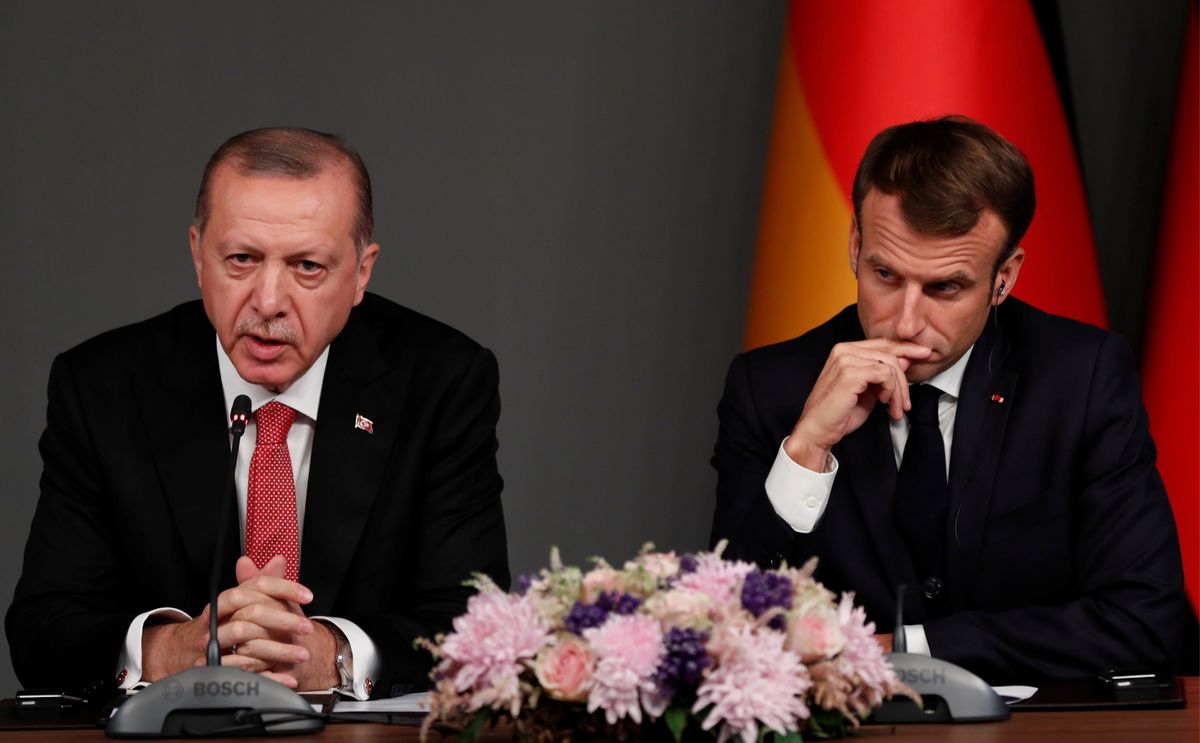Tensions run high between France and Turkey

A few minutes every morning is all you need.
Stay up to date on the world's Headlines and Human Stories. It's fun, it's factual, it's fluff-free.
“You are fascists in the true meaning of the world. You are veritably the link in the Nazi chain," Turkish President Recep Tayyip Erdoğan told European leaders.
Tensions between France and Turkey have escalated in recent days after Turkish President Recep Tayyip Erdoğan questioned the mental sanity of French President Emmanuel Macron. In a statement on October 26, Erdoğan accused Macron of leading a “hate campaign" against Muslims.
The Turkish president’s comments come within weeks of an attack in Paris against a teacher who was beheaded after displaying depictions of the Prophet Muhammad. Erdoğan, in response to the attack, denounced France for condoning the teacher’s use of the caricature.
Many officials in the European Union (EU) have harshly criticized Erdoğan’s remarks. The European Commission suggested that the Turkish leader adapt his approach to avoid hindering attempts at resumed dialogue.
France-Turkey tensions
The discord seems to point directly to a territorial dispute between Turkey and Greece.
In July, Greece announced it had positioned ships in the Aegean in “heightened readiness" after Turkey revealed plans to carry out a drilling survey to examine gas and oil deposits in an area between Cyprus and Crete. Turkey has claimed the area around the islands as its own territory.
The increasing hostility between Turkey and Greece gave rise to Paris’s decision to “temporarily reinforce" its own military presence in the eastern Mediterranean in the hopes of defending Greece and Cyprus’ sovereignty.
Despite France’s decision, some argue that Turkey is not the aggressor in the fight for maritime rights.
“The mainstream media is supporting Western governments’ contention portraying Turkey as the aggressor in their attempt at an energy power grab through naval intimidation," Albert Goldson, the Executive Director of the New York-based think tank The Cerulean Council, told TMS.
“Although Turkey has the largest economy in the region and the second-largest military in NATO, they have been deliberately excluded from critical agreements which would make them equal partners with respect to dispute resolutions and access to resources in the region."
Nevertheless, France and Turkey appeared to take a step toward diplomacy on September 22, communicating for the first time in months amid deteriorating diplomatic relations.
In a statement after the call, the Turkish President emphasized the need for communication to de-escalate the situation and attain long-term negotiations.
The French foreign ministry reiterated this, stating that it hoped a dialogue between Turkey and Greece could resume.
“(Macron) urged Turkey to fully respect the sovereignty of European Union member states as well as international law, and to refrain from any further unilateral action which could provoke tensions," the French foreign office said.
Murder over “freedom of expression”
On October 16, tensions came to a head when a teacher, Samuel Paty, was killed in Paris. Haty was teaching a class on “freedom of expression” and chose to display a depiction by Charlie Hebdo, a popular French satirical newspaper, of the Prophet Muhammad. Displaying images of Muhammad is prohibited in Muslim culture.
President Macron issued a statement condoning the teacher’s decision and deeming the attack “Islamist separatism." This led to outrage on the part of the Turkish president.
In a speech marking the anniversary of the prophet’s birth, Erdoğan accused European leaders of anti-Islamic policies and called on Muslim nations to come to the assistance of Muslims within France.
“You are fascists in the true meaning of the world. You are veritably the link in the Nazi chain," Erdoğan told European leaders.
Just two days earlier, France had announced it was recalling its ambassador from Turkey, noting that the country had urged a boycott of French products.
“The act of removing an envoy from a fellow NATO ally is highly unusual,” Stephanos Chaillou, a political risk analyst specializing in Europe, told TMS.
Chaillou went on to tell TMS that “tensions over culture and religion also help explain the current dynamic."
“For Erdoğan," he said, “portraying the situation as a ‘clash of values’ forms part of a concerted attempt at rallying nationalist sentiment amid declining domestic popularity and worsening economic indicators."
European response
Multiple European leaders rallied behind France in the dispute.
Dutch Prime Minister Mark Rutte signed his name to the list “for the freedom of speech and against extremism and radicalism." Along with Rutte, German Foreign Minister Heiko Maas emphasized Germany’s role in the fight against Islamic extremists, calling Erdoğan’s insults “a new low point."
Greece’s president, Katerina Sakellaropoulou, said Erdoğan’s rhetoric “fuels religious fanaticism and intolerance in the name of a clash of civilizations, (and) cannot be tolerated."
Cyprus’ President, Nicos Anastasiades, similarly condemned Erdoğan’s “unethical verbal attack," suggesting the Turkish President’s comments were “unacceptable in international practice and diplomacy."
Italian Prime Minister Giuseppe Conte also expressed his support for Macron, tweeting of Erdoğan’s rhetoric that “personal invectives do not help the positive agenda that the EU wants to pursue with Turkey, but on the contrary, make solutions more difficult."
As conflict worsens, many fear the implications of the strained relationship.
“As we have seen," says Stephanos Chaillou, “calls to boycott French products are aimed at inflicting economic harm on France’s economic interests abroad."
“A prolonged boycott in a growing number of Muslim-majority countries will increase pressure on companies that export large amounts of goods overseas."
He goes on to warn that “Turkey will likely lose support for its long-running aim of entering the EU as a member state, [and] countries already skeptical to or that strongly opposes Turkey’s bid will likely harden their stance in light of the current situation."
Have a tip or story? Get in touch with our reporters at tips@themilsource.com




Comments ()